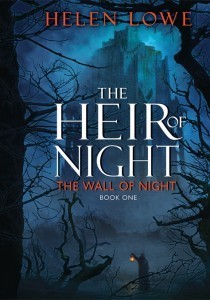Helen Lowe's Blog, page 321
October 19, 2010
"The Heir of Night" Guest Author Series: Anne Hamilton
Anne Hamilton and I have been corresponding via email for a number of years, and I was delighted when, shortly after my first novel Thornspell (Knopf) was published in 2008, Anne's book Many Coloured Realm was accepted for publication by Wombat Books. Anne and I both attended Worldcon in Melbourne last month and so got to meet up in person, which was definitely an added bonus in attending the event. It is with great pleasure that I introduce Anne to you today, as an FSF Author Series guest, with her particular take on the theme of "Why Fantasy SciFi Rocks My World."
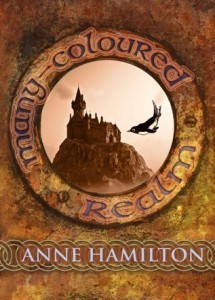 F-SF Guest Author Post: Anne Hamilton—'We are myth.'
F-SF Guest Author Post: Anne Hamilton—'We are myth.'And where else but SFF do we get to explore myth and press its boundaries until it yields its secrets?
The first time I heard it said that we are myth, I felt it was one of those profound statements that spoke an almost-inexpressible truth. My scientific rationalist side, however, was far from satisfied. It kept up a relentless mental circuit of the words, asking, 'But what does that mean?'
Over time, I've had the chance to discover its inner depths for myself. For thirty years, I taught high school mathematics while trying to find a publisher for my book, Many-Coloured Realm. For 27 years, the manuscript 'almost' made it to publication several times. I had the unique opportunity to re-visit the manuscript over long periods of time – decades in which the teaching of algebra changed from imparting a symbolic language to the showing of patterns in number, decades in which I began to wonder about the very nature of inspiration.
What is the difference between 'inspiration' and just a very good idea? There is a difference.
Michael Morpurgo once said: 'It sounds pathetic but until I get the right name for my characters, I can hardly write a thing.' I know that feeling. I've spent months in books of names trying to find exactly the right name for a character. Sometimes I've resorted to making up a name – only to find years later that the multiple meaning I 'made up' fits perfectly. Too perfectly.
As Alan Garner wrote: 'The more I learn, the more I am convinced that there are no original stories. On several occasions I have 'invented' an incident, and then come across it in an obscure fragment of Hebridean lore, orally collected, and privately printed, a hundred years ago.'
I remember Isabel Carmody saying that fantasy as a genre had an undeserved reputation for being the same when, in fact, different authors simply picked very similar incidents from Jung's 'collective unconscious'.
I disagree. I've never believed in the collective unconscious: we're far too individual for that. However, in the struggle to convert my mindset over to teaching algebra as pattern rather than symbol, I began to notice symbolic patterns in all sorts of unusual places, including story-telling.
And because I'd spent so long in those golden books of names, I realised that these symbols and patterns weren't random. Many stories appeared to be equations for a name. And not just any name. The author seemed to wrestle with who she is and engage in a fight to the death with the myth behind her own name.
This is why SFF rocks my world: more of these types of stories are found there than in any other genre. Besides, what more cosmic struggle is possible than the search to define identity and meaning?
When I was growing up, SFF was generally derided as 'escapist'. I've come to the conclusion that 'realistic' fiction is far more deserving of that title. It's ephemeral and transient, rarely lasting to the end of a decade. It doesn't transcend its own culture or time or deal with anything beyond the superficial. However the best of SFF – fantasy, in particular – engages in a struggle with name and thus with identity and destiny. That's why I distinguish between 'inspiration' and a 'very good idea' by looking at how much an author has poured his true self into the work.
I love reading SFF for this very reason. You never know which of them is going to turn out to be the scroll which holds a major secret of identity. You never know when an already-engrossing story is going to embody itself as a stranger reality than the author ever intended.
About Anne Hamilton
I used to love going to creative writing classes and scaring people. As soon as they realised I was a teacher, they'd ask: 'Primary or English?' The moment I said, 'Maths,' people would produce a wan smile and back away.
Perhaps that's the reason my stories incorporate numerical literary style, a fusion of word and number last used extensively in renaissance and medieval poetry (although there's evidence DH Lawrence and AD Hope dusted it off occasionally). Actually, it's because a reviewer of a book about numerical design in some medieval poems sneered at the very idea that anyone would or could ever be stupid enough to create an arithmetic framework for their writing.
What a challenge! I love mathematical metaphor. My recent novel Many-Coloured Realm is 111111 words long with a careful underlying design which reflects the theme. And, of course, I've written this entry in numerical literary style too. Can't you tell?
To find out more about Anne and Many Coloured Realm you can visit her website, here.
—
Just for fun: I'll give away a copy of Thornspell to the first person who correctly identifies the numerical literary style in which Anne has written this entry. (And no, I don't know the answer already!)
—
To see—and read—the other authors who have posted so far in the Guest Series, click here.
There's So Much Happening!
It's only Tuesday and already there's so much happening!
Firstly, The Heir of Night Fantasy-SciFi Guest Author series is absolutely rocking along with fabulous posts over the past few days by Juliet Marillier, Tracey O'Hara and Michael Pryor–and of course Tim Jones' post last week was picked up by mega site io9. Coming up tomorrow is AU Kids/YA author Anne Hamilton, with Canadian SFF writer Julie Czerneda on Thursday—and having had a sneak preview I can tell you already that they're great posts! So do keep visting and if you like, well do support the author with a comment!
Coming back to The Heir of Night, I am scheduled for a Big Idea guest post on John Scalzi's Whatever blog for this Thursday 21, US time. I'm going to be talking about the Big Idea that is driving, not just The Heir of Night but the whole The Wall of Night quartet—and there really is one! I hope you'll find it interesting and that you'll drop on by and post a comment. (Support an " … on Anything, Really" gal out there in "Whatever" land!)
The fun doesn't stop though, so I'm off to Armageddon (ASB Stadium, Auckland) this Saturday 23, joining the good people at the Whitcoulls Stand, Stall 45, at 11.30 am for a signing and to answer your questions and chat about The Heir of Night and being an internationally published Fantasy-Science Fiction author!
Last but not least—if you live in or near Wanganui, there's a chance to win a copy of The Heir of Night as part of the Wanganui Chronicle's reader rewards programme: check out the newspaper for the details.
October 18, 2010
Tuesday Poem: "Nanosphere" by Harvey Molloy
The Enemy of the World
watery eyed, unkempt,
finally captured after months in a hole.
A lab coat prods his back dentures
with a disposable spatula. How
slow and compliant the prisoner moves
like a rest home inmate.
In this cosmos his capture
shall be eclipsed by news
of the accidental discovery of the end of time
as weightless above this earth
from the station console
Irina checks the Doppler shifts
from the Sombrero, Andromeda, closer Tau Ceti.
Aware of the pressure of the moment
she pauses to gaze at the withered fingers
of a passing river delta
then tells Control her final confirmation:
the expansion is over and the big crunch has begun
the slow seven billion year retrenchment
from universe to nanosphere.
Her news crosses the twittering
of the only known radio intelligence:
0800 chatline numbers
psychic advice lines
impending Serbian elections
weather updates
body counts
Chinese operas
Marilyn's slow turn in a hall of mirrors
Chico and the Man.
The day's journeying calls roll out
within the bounded horizon of vast contracting dot.
There is only so much time and time is running back.
The children watch television in the dark.
(c) Harvey Molloy
Published in Voyagers: Science Fiction Poetry from New Zealand, Ed. Tim Jones & Mark Pirie, Interactive Press, Australia, 2009
—
About Harvey Molloy:
Harvey's poetry and short fiction have appeared in Albatross, Blackmail Press, Brief, Bravado, Jaam, Lancashire Life, The Lumière Reader, NZ Listener, Poetry New Zealand, Southern Ocean Review and Takahe. He is a previous winner of the New Zealand International Poetry Competition for his poem "Diwali "and his first book of poems, Moonshot, was published by Steele Roberts in 2008. He has also published non-fiction work on Asperger Syndrome, and is the co-author, with Latika Vasil, of the book Asperger Syndrome, Adolescence, and Identity: Looking Beyond the Label. He is now working on his second book of poems. Harvey is a secondary school teacher in Wellington, New Zealand. You may also visit Harvey on his website, here.
—
About Nanosphere:
I have previously featured another Voyagers anthology poem as my Tuesday Poem selection (Tim Jones' The First Artist on Mars)—but Voyagers contains many outstanding poems. In particular, I very much like the way Harvey Molloy's Nanopshere makes the speculative shift from a real world event to the cosmic stage in a way that juxtaposes an array of "relativities". It seemed both fitting—given that I am currently hosting a series of guest posts by Australian and NZ Fantasy-Science Fiction authors—and timely to feature another science fiction poem from an anthology of New Zealand poems brought out by an Australian publisher.
—
To read the featured poem on the Tuesday Poem Blog—and link to other Tuesday Poets posting around NZ and the world—either click here or on the Quill icon in the sidebar.
October 17, 2010
"The Heir of Night" Guest Author Series: Juliet Marillier
Juliet Marillier, the eight author in the F-SF Author Guest Series can legitimately claim to be both a New Zealand and Australian author, and I suspect needs very little introduction given the international success of both her adult Sevenwaters series and her YA novels that commenced with Wildwood Dancing. I was pleased to meet Juliet in person at Worldcon in Melbourne and am delighted to have her here as a guest author today, providing her take on the series' theme of "Why Fantasy-Science Ficton Rocks My World."
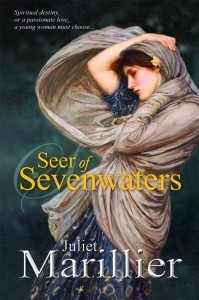 F-SF Guest Author Post: Juliet Marillier
F-SF Guest Author Post: Juliet MarillierThanks for having me, Helen, and congratulations on the release of The Heir of Night!
Readers often ask me, 'Why did you decide to write fantasy?' My answer is, I didn't. There was no conscious decision about it.
I've been a writer since I was five or six. My first effort featured a rampaging killer robot. In my second, scientists found a plesiosaur in Fiordland. At nine, I was starting to look like a science fiction writer. But my reading was not in the least scientific: I devoured all the fairy tales, myths and legends I could get my hands on. I discovered the treasure trove of Welsh mythology, the Mabinogion, at about twelve, and I can still remember the awe I felt, reading the dancing words, and being swept into a world of high themes and heroic journeys. A year later, I gave my classmates a comprehensive run-down of The Lord of the Rings, complete with a diagram that took up the entire blackboard. I knew nothing about genres then. I just knew I loved a good story, and if it had the same elements of heroism, adventure and magic as those traditional tales I'd grown up on, so much the better.
Real life got in the way of my writing for a long time. At 45, I was still growing up.
There's a point in most old stories where the protagonist reaches a crossroads. My life reached that point and I faced a choice. Be brave and go down the unpredictable path, the twisty way into the forest with its sudden drops, its shaky bridges, its monsters lurking beneath the dark trees? Or keep on the straight, familiar road, which held more than its share of sorrows?
It turned out my belief in magic was still there, deep down. I took the perilous path and, soon after, became a writer. A fantasy writer? Some would say so, since my novels always include the uncanny, the magical, the voice that whispers in the protagonist's ear, the character who may not be quite human, the charm that changes lives forever. But I did not set out to write speculative fiction, only to tell a story and tell it in the light of all those years of life experience, the terrible mistakes, the frequent self-doubt, the moments of joy and triumph. I wanted to live a journey with my characters, to walk in their shoes, to discover how they would cope with their own challenges and to experience the wonders their world could offer.
No wonder my first novel was based on a fairy tale. That it was in the fantasy genre never occurred to me. This was the story I had inside me, a tale of wonder and enchantment, courage and sacrifice, peopled not by superhuman characters, but by ordinary men and women. I found, then, that I had many such stories to tell.
As speculative fiction writers we wield the same power as the storyteller by the fire, using words to ward off the dark. While our stories entertain, they can also provide codes for living, offer comfort and healing, and make sense of the Other. A horror writer may give us insight into the darkness within a human mind. An SF writer might inspire hope of change. A fantasy writer can keep a reader's dreams alive in a time of trouble. Each of us can open a portal to realms of wonder, drawing our readers out of their everyday lives and into places where virtues such as courage, faith, loyalty and true love do not hide in the corners, but blaze bright upon the page.
 About Juliet Marillier:
About Juliet Marillier:Juliet Marillier was born and brought up in Dunedin, New Zealand, and now lives in Western Australia. Her historical fantasy novels have been translated into many languages and have won various awards including the Aurealis (three times), the Sir Julius Vogel Award and France's Prix Imaginales. Her next book out is Seer of Sevenwaters, to be published by Roc (US) and Pan Macmillan (Australia) in December 2010. Juliet is a member of the druid order OBOD. She lives in a hundred year old cottage which she shares with a small pack of waifs and strays. Find out more at her website: www.julietmarillier.com You'll find regular contributions from Juliet on genre writing blog Writer Unboxed: www.writerunboxed.com
October 16, 2010
"The Heir of Night" Guest Author Series: Tracey O'Hara
When Eos (HarperCollins, USA) purchased the North American rights to publish The Heir of Night in 2008, they were also about to publish a hot new Australian author, Tracey O'Hara, in 2009. Naturally, Tracey and I got to emailing—at least semi-regularly in between edits, copyedits, first pass proofs et al—and then earlier this year we both joined the Supernatural Underground, a blog of HarperCollins USA specfic authors. (In fact, Tracey played a major role in setting it up.) So it is with very great pleasure that I now welcome Tracey as the fifth guest in the F-SF Guest Author Series, blogging on our theme of "Why F-SF Rocks My World."
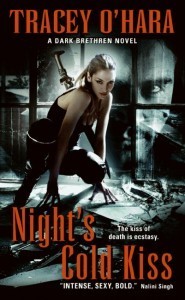 F-SF Guest Series Post: Tracey O'Hara
F-SF Guest Series Post: Tracey O'HaraFantasy and Science Fiction have always rocked my world as a reader, watcher and now, as a writer. It all started with Enid Blyton's THE MAGIC FARAWAY TREE series that my year two teacher started to read us. I never much got into THE FAMOUS FIVE or her other ones, but that tree with pixies, fairies, Moonface and the ladder to other worlds totally had me captivated.
As a watcher – I fell in love with Star Wars and then came the rash of SF movies of the '80s. I read Issac Asimov's ROBOTS OF DAWN when I was 14 and totally loved it. Then came Stephen King and my love of horror. But it was at 20, when met my (now) husband, that I got into fantasy. He gave me Raymond E Feist's MAGICIAN and I was totally hooked. I was suddenly transported to other worlds where anything was possible.
I was never one of the people that wanted to write from a young age. Actually – I was the opposite. A total maths and science geek in school, I would break out in a cold sweat if I had to do a creative essay for English class. Don't get me wrong, I loved to read, but I didn't have any desire to write at all. However, looking back, the story telling was always there. As a child I had a "tribe" of tiny 3-inch people dressed in bright colours that I used to teach things and tell stories too. My mother said I was always off chatting away to myself – well I wasn't really, I was talking to my very-visible-to-me imaginary friends.
I do remember the day the writing bug hit me in March 2004. I had written some small piece on my family history that I was researching and showed it to a friend who said "you know, you have a flare for writing, have you thought of doing fiction?" Well no, I hadn't – until that point. That same friend said there was heaps of money in "bodice rippers" and we should write one together. It was easy to bang one out and easy money (yeah right, and pink space monkeys live in my closet and dance the fandango).
A story idea hit me like a tonne of bricks – only it turned out to be more of a colonial saga type story using the research I'd been doing. It soon became apparent that my writing partner and I had differing ideas and voices and I was soon working on my own – taking the story in the direction I wanted it to go. I'm such a control freak.
In the process, I had the spark of an idea for a vampire story, seeing I loved horror. Again it was someone saying the market was looking for paranormal romance that got me started. So I turned that spark into the beginnings of a paranormal romance, having never even read one before. It soon became apparent that I was going to go a little darker than was really acceptable at the time for romance. Or so I thought until I read Charlaine Harris. All of a sudden this entire new world opened up to me in more ways than one and NIGHT'S COLD KISS was born.
Being grammatically and punctuationally challenged, I actually had to learn the rules of English literature. But it was the fantastical world of mythical beings opening up in my head that really had me ticking. It was like it had been there all the time, this fully functioning world with rules and structure and I became an explorer, discovering the hidden secrets. The story came first, and then the craft. And I finally finished my first book.
Now I can't imagine doing anything else. I watch a lot more SciFi than I read and read more Fantasy than I watch. So between that and writing, SciFi and Fantasy not only rocks my world, it's become my life.
About Tracey:
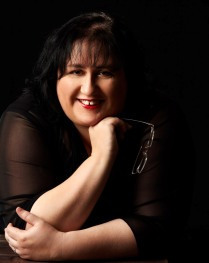 Tracey O'Hara made her publishing debut in 2009 with the release of her Eos Books urban fantasy novel NIGHT'S COLD KISS which went on to be short listed for the Aurealis for Best Horror novel for 2009 and win the RWA 2010 Romantic Book of the Year – Romantic Elements. Tracey grew up reading Stephen King, Raymond E. Feist, and J.R.R. Tolkien, where she developed her taste for adventure and the paranormal thriller. When she's not writing, reading, or listening to heavy metal, she spends time with her husband, two sons, and two cats. To find out more, please visit Tracey on her website.
Tracey O'Hara made her publishing debut in 2009 with the release of her Eos Books urban fantasy novel NIGHT'S COLD KISS which went on to be short listed for the Aurealis for Best Horror novel for 2009 and win the RWA 2010 Romantic Book of the Year – Romantic Elements. Tracey grew up reading Stephen King, Raymond E. Feist, and J.R.R. Tolkien, where she developed her taste for adventure and the paranormal thriller. When she's not writing, reading, or listening to heavy metal, she spends time with her husband, two sons, and two cats. To find out more, please visit Tracey on her website.
October 15, 2010
"The Heir of Night" Guest Author Series: Michael Pryor
I met Michael Pryor through Worldcon, where he was the organiser of the YA Programme and did an excellent job—and not just because he asked me to moderate two panels! Being a programme organiser though, meant that Michael was very busy throughout the convention so we only got to meet up briefly: even more reason, I felt, to meet up again through this F-SF Guest Author Series. I know you're going to enjoy Michael's take on why F-SF rocks his world!
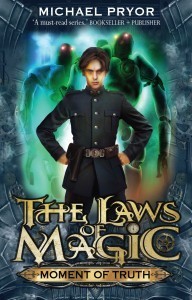 F-SF Guest Series Post: Michael Pryor Says "Fantasy and Science Fiction are the Best !"
F-SF Guest Series Post: Michael Pryor Says "Fantasy and Science Fiction are the Best !"Two things about Fantasy and Science Fiction are the best: the writers and the readers.
Fantasy and Science Fiction are the best for a number of reasons. For a start, Fantasy and Science Fiction are the most challenging forms of writing to undertake. I have to do everything that other writers do, like have convincing, multi-dimensional characters and engaging, lucid prose PLUS incorporate all the imaginative elements that are the hallmark of Fantasy and Science Fiction. Then I have to deal with the consequences of this, making sure I don't fall foul of inconsistencies because of the scenario I set up at the beginning of my story. Fantasy and Science Fiction writers simply juggle more balls at the one time than other writers.
Also Fantasy and Science Fiction writers are the best because we get to deal with profundities.
Fantasy and SF are the Literature of the Profound. Writers who spend their times documenting the trials of everyday life don't have the opportunity to deal with the philosophical questions that have intrigued us all since the dawn of time. Who are we? What are we? Where did we come from? What makes us what we are? These fundamentals about our existence are meat and drink to Fantasy and SF writers as we imagine other worlds where Normal Rules Do Not Apply. Situations like this give us ample room to explore what it means to be human or the basis of moral choice or place of aesthetics in our society.
Time to pluck an example. I can't imagine a mainstream novelist producing a work that examines the Sapir-Whorf Hypothesis of the interaction between language, culture and cognitive abilities, but that's just what Jack Vance did in his 1958 novel The Languages of Pao by positing ruthless overlords who created a global experiment to test how imposition of languages could shape various societies into ultimate warriors, consummate merchants or brilliant scientists. Not only did Vance explore this fascinating possibility, but he embedded this speculation in a rattling good yarn.
One example, decidedly non-random, but my point is that Fantasy and Science Fiction don't just allow exploring such matters, they actually enable this exploration. This is because one of the strengths of these related genres is their limitlessness. Nothing is out of bounds for a Fantasy or SF writer to speculate about. In fact, any hint of boundaries prompts Fantasy and SF writers to wonder what lies on the other side. We imagine. We create.
Everything is grist for the mill, and that's another reason Fantasy and Science Fiction writers are the best.
It helps, of course, that Fantasy and SF writers have the best readers in the world. That isn't blatant sucking-up, either, even though it might sound like it. Whenever Fantasy or SF readers open a new book, they know that that they have to be on their toes, that they have to do some work. In this book, things will be different – and they have to read carefully to understand the world, the society, the magic system or the political milieu that the writer has created. Fantasy and SF readers are ready for this, and they rise to the challenge.
This of course, is the reason why one hears, so often, from non-genre readers who say about Fantasy and Science Fiction: 'I couldn't get into this'. This is because they've become weak and flabby, unable to work even a little bit hard. Their reading antenna have been dulled by years of reading mainstream novels where they just have to look at character, while taking the setting for granted – and not being worried about having to keep up with anything as grubby as an actual plot.
Naturally, I have my tongue in my cheek here, but the fact remains that just as Fantasy and SF Writers are the best because they had to do more, then Fantasy and SF readers are the best because they have to do more.
I love Fantasy and Science Fiction.
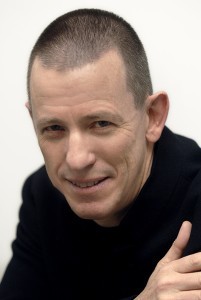 About Michael Pryor:
About Michael Pryor:Michael Pryor is a best-selling author of fantasy for teenagers. He has published over twenty novels and more than 40 short stories. He has been shortlisted for the Aurealis Award six times, and five of his books have been CBCA Notable books. His website is www.michaelpryor.com.au.
October 14, 2010
Tim Jones Guest Post Re-Posted on io9!
Tim Jones's guest post in "The Heir of Night F-SF Guest Author Series" has been reposted on io9 today—-and here's the link so you can check it out for yourself. And congratulations, Tim: it's a great article and deserves to be so widely read!
Cover Love
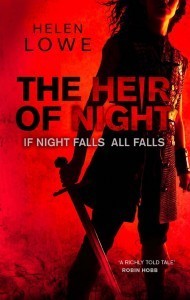
AU/NZ Cover
Eos (HarperCollins USA) have just posted my lasted guest post on "Cover Love" on their Out of this Eos blog: you can check it out, here.
And earlier in the week Orbit featured a guest post on "The Heir of Night: Keeping It Real with Armour and Weapons."
Some more fun stuff to check out for the end of the week. And tomorrow, the F-SF Series will be back with guest author, Michael Pryor.
It's Friday Update!
It's Friday—and as we have a "lull" in the F-SF Guest Author Series I thought it could be time for an update on what's happening around the "… Anything, Really" traps.
Firstly, about that Guest Author Series—I know that both I and the guest authors are delighted that so many of you are visiting to read their posts on the topic of "Why F-SF Rocks My World" and that some of you are even writing in through my website to say so: thank you! Nice, too, to see that the series is being picked up in other places, such as this post on the ACC Library Blog.
Draw to Give Your Name To A Character in The Wall of Night, Book Two—And don't forget that so long as the F-SF Guest Author series is running, any comments you post will qualify you for the Draw to Give Your Name To A Character in The Wall of Night, Book Two. Just in case you've forgotten, here's the details:
Provisos:
Each time you comment on a post by an F-SF guest author (in the series starting tomorrow) your name will get an additional entry into the draw (only 1 new entry per F-SF author post, however);
The name included in the book is to be your real name;
I reserve the right to adapt your name to best fit a fantasy character, e.g. "John the Miller" as opposed to "John Miller", but your full name and the winning of this competition will be included in the "Acknowledgments" section of the book.
Note: If you don't want your name included in the draw, just write "n.i.d." (not in draw) after your comment.
Speaking of Libraries: Christchurch City libraries have posted a new author interview with me where the discussion covers many things, including The Heir of Night and Thornspell.
Armageddeon, Saturday 23 October—I'll be at the Armageddon Expo in Auckland on Saturday 23 October, joining the Whitcoulls team (Stand 45) at 11.30 am to talk about the genesis of The Heir of Night and why I love—and most particularly write!—epic fantasy. So if you live in Auckland or are visting over the Labour weekend break, I would love to see you there.
What Else Have I Been Up To This Week? Fired by your enthusiasm for the next instalment in The Wall of Night series I've been working very hard on WALL2 (Working Title: The Gathering of the Lost) with over 8000 words under my belt so far this week. My goal for the month—to see if I can't knock off 60,000 words, which should just about see the book done. I'll keep you posted on how I'm going—and btw: inducements may be offered!
And today I've drafted my Big Idea post—on the Big Idea behind The Heir of Night and The Wall of Night series—for 21 October, when I'll post as a guest on John Scalzi's Whatever blog. So do put that date in your diaries and come on over to support me with a comment on the day. You know I'd love to see your friendly faces there!
October 13, 2010
"The Heir of Night" Guest Author Series: Tim Jones
Tim Jones is a New Zealand based novelist and short fiction writer, poet, editor and blogger—but most importantly (to me; I concede Tim may see it differently!), a friend in speculative fiction and one of my first writing contacts in the field. Unfailingly generous and supportive, it is with very great pleasure that I introduce Tim to you today, posting on "Why F-SF rocks [his] world."
—
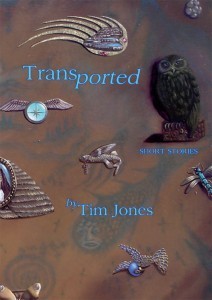 F-SF Guest Series Post: Tim Jones
F-SF Guest Series Post: Tim JonesThe good news is, we're living in a science fiction novel. The bad news is, it was written by J. G. Ballard.
When people complain that the Golden Age of science fiction never came true, they usually mean that the space programme has devolved to a series of uncrewed robot missions, or that we don't all have flying cars. But another, slightly later era of science fiction — the era I grew up with — is showing a dispiriting level of predictive power.
I'm referring to the science fiction of the late 1950s through to the 1970s: the social SF of writers like Fred Pohl, Ursula Le Guin and James Tiptree, Jnr, on the one hand, and the British New Wave SF exemplified by J. G. Ballard on the other.
Ballard, that exhilarating, exasperating bard of entropy, turns out to have had sharper eyes than most. The other day, I was looking at images on my computer of housing developments in the US abandoned in the wake of the credit crunch that started in 2008: rows of McMansions, left uninhabited because their owners could no longer afford the mortgage payments, standing empty and desolate, their drained swimming pools filling with leaves.
These were images straight from an early Ballard novel. Of course, the basis for all that imagery was Ballard's own experience, early in World War II, of being wrenched from a privileged expatriate enclave in Shanghai into Lunghua internment camp, and seeing the world he knew collapse around him.
A counterexample: one of the concepts that excited me most in the SF I read as a youngster was the universal translator, a device that would render any language immediately intelligible to someone who did not speak or read it. Now I have a universal (or close to universal) translator at my fingertips. It's called Google, and all I have to do is press the "Language tools" link to the right of the search box to access what is (though we rarely think of it in these terms) its quite astonishing power.
Did I get into reading, and then writing, SF because of its predictive ability? Not at all. I started to read SF because it offered an escape from the rigours of life as a young English boy growing up in a part of New Zealand that didn't have a lot of time for Pommie bastards who spoke funny. I kept reading it, and began to write it, because it spoke to me about my life and my hopes for the future far more directly than any number of novels about status anxiety in middle-class drawing rooms. And I keep reading it today — though my reading has broadened greatly from the days when SF was almost all I read — because the best SF still speaks to my hopes and fears for myself, my family and the world in all the ways that mainstream fiction, for all its virtues, often does not.
That's why my favourite SF writer over the last decade or so is Kim Stanley Robinson. His best books, notably his Mars Trilogy, bring together everything I have loved in SF over the years: there's the hard-SF world-building, the fascination with the interaction of characters adapting to a new environment, the politics of inhabiting and organizing a new world, and under it all an enduring sense of wonder at the strangeness and beauty of the universe. That's the sort of SF I like to read, and the sort of SF that, when I can, I like to write.
Robinson's hopes and Ballard's fears. Somewhere in between these two marquees, I pitch my tent.
—
About Tim Jones:
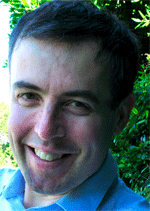 Tim Jones is a poet and author of both science fiction and literary fiction. He lives in Wellington, New Zealand. Among his recent books are fantasy novel Anarya's Secret, short story collection Transported (Vintage, 2008), which was longlisted for the Frank O'Connor International Short Story Award and is now available for the Kindle, and poetry anthology Voyagers: Science Fiction Poetry from New Zealand (Interactive Press, 2009), which he co-edited with Mark Pirie. Voyagers won "Best Collected Work" at the 2010 Sir Julius Vogel Awards.
Tim Jones is a poet and author of both science fiction and literary fiction. He lives in Wellington, New Zealand. Among his recent books are fantasy novel Anarya's Secret, short story collection Transported (Vintage, 2008), which was longlisted for the Frank O'Connor International Short Story Award and is now available for the Kindle, and poetry anthology Voyagers: Science Fiction Poetry from New Zealand (Interactive Press, 2009), which he co-edited with Mark Pirie. Voyagers won "Best Collected Work" at the 2010 Sir Julius Vogel Awards.
The latest news about Tim and his writing is on his blog at http://timjonesbooks.blogspot.com/

